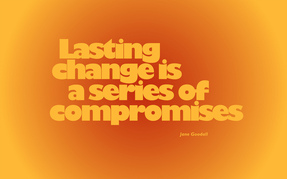| | Compromise. Defined as something intermediate between different things. It is an essential ingredient in making a relationship last. Sometimes settling a disagreement can be easy, like figuring out who will be picking the next vacation destination or buying a car that has both the important features you and your partner want. However there are other times when the disagreement is more difficult to resolve and the compromise is harder to swallow. In these times, what you did to compromise in the past may not work because the disagreement is most likely intertwined with your core values. We usually become more rigid to compromising when it comes to a disagreement involving our core values. So we either stalemate with our partner on this or we do our own thing. Neither are a good example of compromise and both can be harmful to our relationship. Just like resolving conflict brings us closer together, failing to resolve conflicts create distance between us. If you can recall a disagreement that did not get anywhere with your partner, think about how easy or hard it was to bring up the issue again. The more we disagree without resolving things, the harder it is to discuss future issues. So how can you get one step closer to compromise and problem solving a difficult or gridlocked issue? The answer is not easy and takes patience. But it will be worth it. There are several steps to take before getting to the step of compromising. Before you or your partner can be open to persuasion or compromise, it is important that you both express understanding of the others position. Until we feel heard and understood, it will be very hard to give up something to settle a disagreement (which is what we do when we compromise). Here are some tips that can ease you into a compromise. Start the conversation by stating what you feel and need in a positive way. We often go straight to telling our partner what needs to be done to resolve the conflict rather than expressing how the conflict affects us. Therefore we overlook the impact that the sequence in which we express ourselves has on resolving conflict. Starting with our feelings allows our partner to empathize with us and this contributes to a more open conversation. Leave judgment , blame, and criticism out of the conversation at all times. No one likes to feel blamed or judged, yet we easily spit it out with little regard for our partner's feelings when we disagree. The conversation can close up and turn our partner away from compromise when we engage in any of these things. Listen and validate your partner before responding. This is a respectful way to convey that we hear our partner and understand their point of view. It also ensures that we are on the same page and decreases the likelihood of miscommunication or shutting down. Make a list. One side of your list will identify areas of flexibility and another side will identify areas of core beliefs. It is important to stand by our beliefs, but not in a way that keeps us rigid. We can then compare this list with our partner's list, and find a common area of flexibility. Then a compromise is just around the corner. |
|
0 Comments
Leave a Reply. |
Archives
February 2018
Categories |

 RSS Feed
RSS Feed
